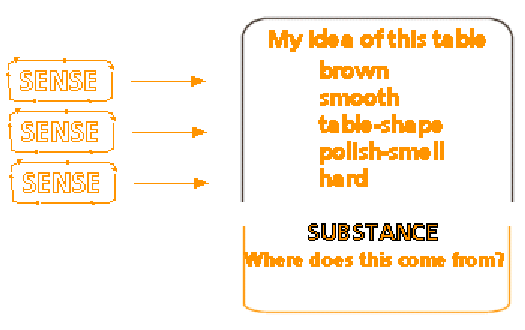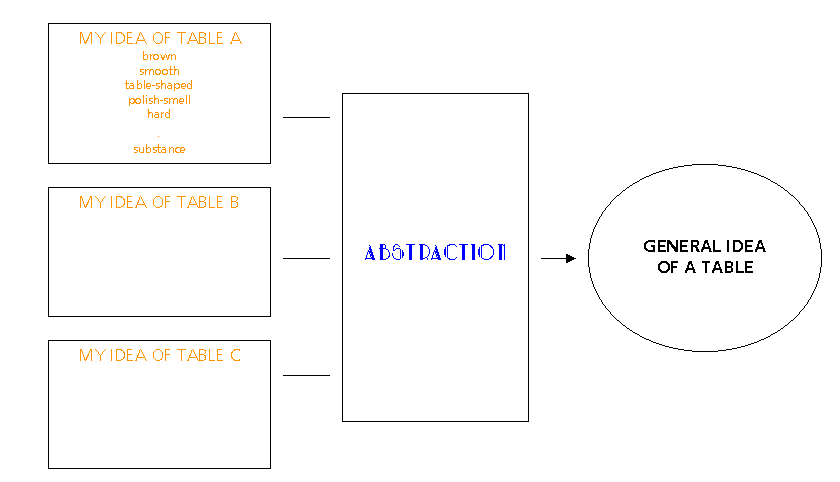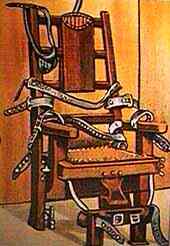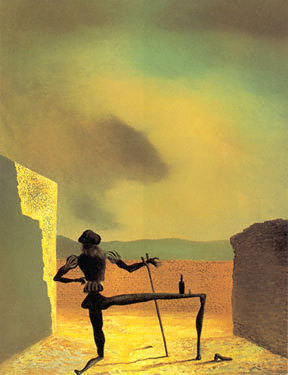
|
|

|
|
Contents |
Locke's views and arguments on topics that concern philosophers today are
presented to us by Locke in an oblique way. His programme is to offer what we
should call a scientific account of thinking. He does this by taking as his main
analytical tool the concept of an 'idea', which he conceives of as a mental
atom. A second analytical tool is the concept of something that can both
'scrutinize' ideas and 'manipulate' them. Locke usually refers to this as the
'mind' itself. Critics have called it an (illegitimate) 'homunculus'.
He adds to the theoretical apparatus of ideas and scrutineer/manipulator the
claim that all ideas come from either outer sense or inner sense - reflection.
This apparatus is enough to allow him to state his theories
about a number of key questions. What is knowledge? What is reasoning? What
is meaning?
Would you like to write in a sentence each Locke's theories on these matters?
Locke's commitment to the claim that all ideas come from sense or reflection
involves him in putting forward a theory about most things. Whatever idea his
critic comes up with, Locke has to give an account of how that idea derives from
sense or reflection, and some of the ideas that the critic puts to Locke, and
which he puts to himself of course, are ideas that have been the topic of
philosophical interest.
Some internet stuff:
Some relief:
|
We have seen some of these. For example, the idea of 'infinity'. How does Locke
think this is derived from experience? He has an answer, but the point I am
getting at here is not what his answer is but the fact that he has to have one.
He has to be able to show that this idea, like every other, derives from experience,
and in giving his answer he has to take a view on the philosophical question
which we might express by asking what infinity is.
In this way, Locke's project, which is to give a scientific account of the
workings of the mind, involves him in addressing, or at least taking a view
on, pretty well all the great philosophical problems. His project isn't directly
to address comprehensively all philosophical problems, it is to offer a theory
of the workings of the mind: but that is what he ends up doing.
Our first topic here is Locke on 'substance'. It is complicated by his approach
to the problem or problems with 'substance', which is why I have just explained
it. The question he is going at directly is how we can have acquired our idea
of substance. But we today, and I think his contemporaries, were not crystal
clear about the idea of substance to begin with, so there are
two really quite separable issues which get all tangled up. One is what our
idea of substance is, and the second is how that idea , once we are clear what
it is, can have been got from experience.
Though we ourselves use this word 'substance' and hence can sort of agree
that we have the idea, it seems fairly clear that our idea of substance may not
be the same as the 'idea' of substance that was foremost in Locke's mind as he
addressed the question of where this idea came from.
What we have then are two questions:
And then perhaps a third:
So what idea or ideas of substance did Locke think we have?
A leading thought of Locke's when he is discussing the idea of substance is
this.
When you see and have other sense experience that we might describe as perceiving
a table for example, what you get through the senses are ideas of qualities:
the idea of brown, the idea of rectangle shape, the idea of polish-smell when
you sniff the table and so on.
These are all ideas of qualities - properties - of the table. But what of the
idea of the table itself?
Locke says to himself: I have explained the origin of the ideas of the various
properties of the table - they come through the senses - but what of the idea
of the table as such?
You may think there is a simple answer open to him: why doesn't he say that
the idea of a table is a complex idea formed by the set of ideas of the table's
qualities?
Locke himself is not completely clear whether he rejects this account or not.
You can interpret him as saying that there is something more to my
idea of a table than the sum of the ideas of the qualities.
He would then be saying that the idea of this table is complex, and that belonging
to the complex are the various ideas of qualities we get when we have experience
of a tree: but that there is something else. The 'something else' is our idea
that these qualities inhere in something, belong to something.
On this construal he is saying that when you add the ideas of the qualities
of a table to the idea that all these qualities inhere in something you get
the complex idea of the table.
Locke seems to be saying that when we have experience of a particular kind
of thing, say a table, the particular thing we are looking at gives us a number
of ideas: for example, the idea of a particular shape, the idea of a particular
polish-smell, the idea of brown, in a certain pattern. These same ideas co-occur
every time we see an item of this type.
Locke seems next to say: we infer from the co-occurrence of these ideas that
they must belong to one and the same thing.
And he concludes by saying that it is this single thing, the single bearer
of the set of qualities which gives rise to the recurrent set of ideas that
we call 'substance.'
A substance is that which bears qualities. It is not a quality itself.
Qualities inhere in it.
Here is a key passage. See if you think what I have just offered is a correct
interpretation:
of simple ideas conveyed in by the senses, as they are found in exterior things,
or by reflection on its own operations, takes notice also that a certain number
of these simple ideas go constantly together; which, being presumed to belong
to one thing, and words being suited to common apprehensions and made use of
for quick dispatch, are called, so united in one subject, by one name; which,
by inadvertancy, we are apt afterward to talk of and consider as one simple
idea, which indeed is a complication of many ideas together: because, as I have
said, not imagining how these simple ideas can subsist by themselves, we accustom
ourselves to suppose some substratum wherein they do subsist, and from which
they do result; which therefore we call substance.'
An Essay concerning Human Understanding,
Bk II, Ch. XXIII, Section 1.
The alternative reading of this passage, and of Locke's position in general,
is that our experience of sets of qualities always going together is the source
of a kind of illusion. We experience a packet of ideas always going
together and assume that this means they must all inhere in one and the same
thing - but mistakenly.
He would then be explaining how we can mistakenly think we have a
conception of substance. He would then be saying that it is an illusion
generated by the constant co-occurrence of a set of ideas.
This in fact would be really helpful to him, because he would then not be obliged
to explain the origin of this idea of substance (since there isn't one really).
Critics say that anyway he can't. As he has described it, the idea of substance,
the critic says, cannot be got through the senses; nor can any plausible account
be given of how it might be got from introspection.
Let me give though, as a reprise, the first interpretation of Locke. It goes
like this:
How, according to Locke, do you get the idea of a particular object?
When I look at an object, through my senses I get a set of ideas, each corresponding
to one of the object's qualities. E.g. the idea of brown, the idea of rectangularity,
the idea of hardness. I then add to this set of ideas a further idea, namely
the idea that the qualities which have given rise to the set of ideas of sense
'inhere in something' - belong to something.
This idea that I add is called by Locke 'the idea of substance'.
If I am looking at a table, I get the ideas of hard, brown, table-shape
(and some more); I add to these to the idea of substance; and
this set of ideas together constitutes my complex idea this table.

The next problem is: How you get general ideas?
Let us try and have clearly in our minds the distinction between
particular ideas and general ideas. (Locke makes the distinction,
and although he is addressing a problem we perhaps recognize today, the
distinction is not quite one we today find clear.)
This table is a particular; the concept table is a general
concept.
Locke's account of 'generality' is this:
We make a pile in our minds of particular ideas and if they have anything in
common, that gives us the general idea. E.g., we make a pile in our minds of all
the particular ideas we have of particular tables, and by discounting all
respects in which those particular ideas differ from each other, we derive the
general idea of table.

That is Locke's account of generality.
Please think of one chair you have in your life.
Make a list of ten of its features. Include all the obvious ones.
I read out one of these lists, and each of you puts a ring round the feature
I read out if you have it on yours. If having heard this feature listed by someone
else, and you had missed it out inadvertently - please add it to your list,
and ring it. Remember, you should be thinking of a particular chair you know
well.
I will then go through the list again and I will ask: anyone who hasn't ringed
such and such a feature. If there is anyone who hasn't, that means that feature
is eliminated.
Any feature left is a component of the general idea of a chair (according to
Locke).
 |
|
Dali: Ghost of Vermeer of Delft Which Can Be Used as A Table (1934) Courtesy the Dali Museum |
|
|
|